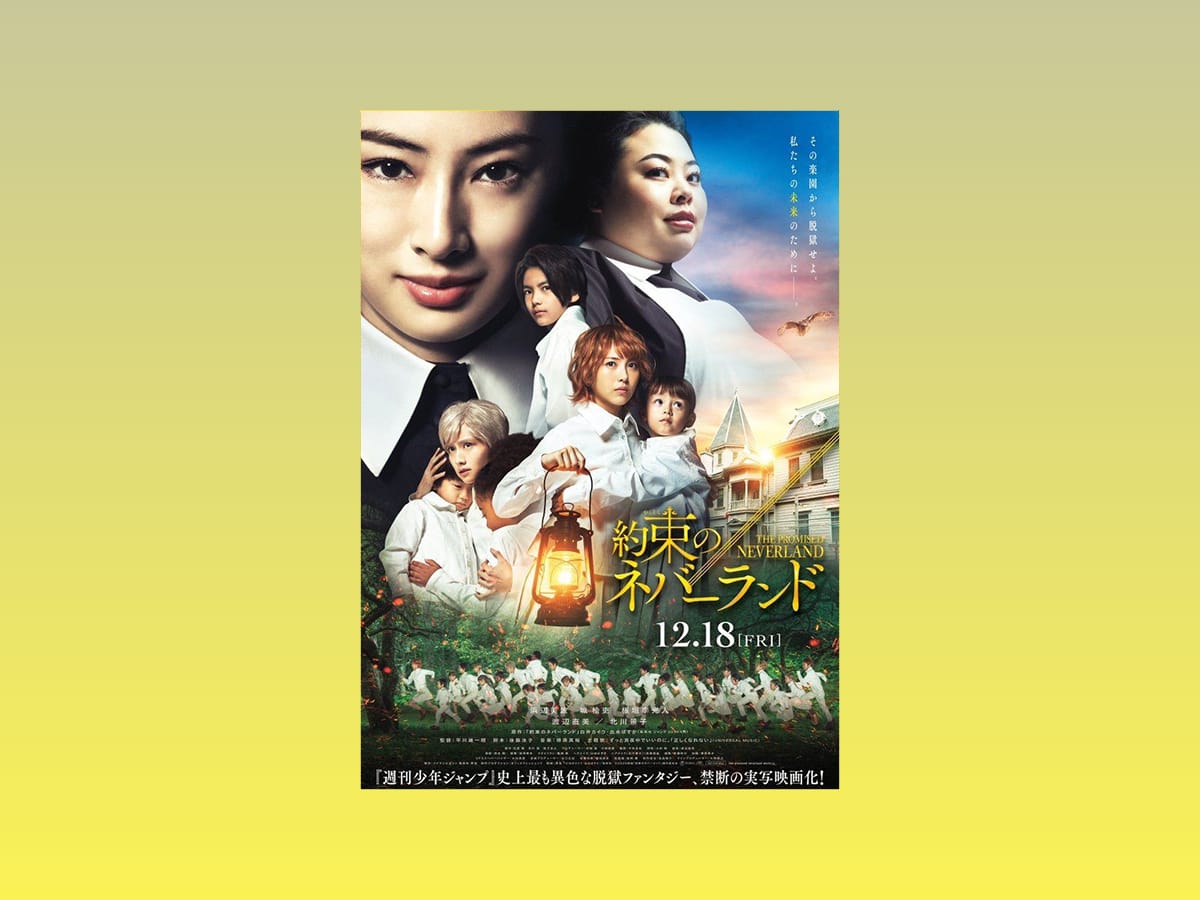
©白井カイウ・出水ぽすか/集英社 ©2020 映画「約束のネバーランド」製作委員会
Interview with Ken Murase from “The Promised Neverland” – Producer
- Tags:
- Drama / Fuji Television / Fuji Television Network Inc. / Fuji TV / Ken Murase / live action film / Movie / The Promised Neverland
Related Article
-
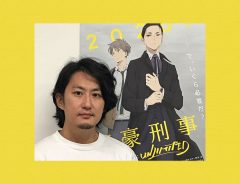
Interview with Taku Matsuo from “The Millionaire Detective Balance:UNLIMITED” – Producer
-
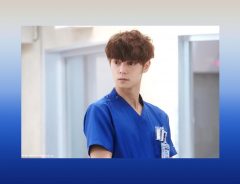
Exclusive Interview with Masataka Kubota from “Radiation House II”
-
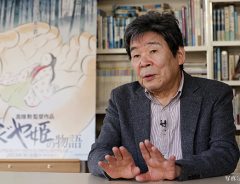
Japanese Animation Fans Mourn Loss of Studio Ghibli Co-Founder Isao Takahata
-
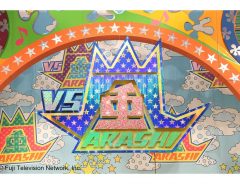
Interview with Yuuki Banjo from “VS ARASHI” – General Director
-
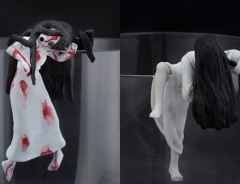
Sadako And Kayako Cup Clingers Will Give Your Drink The Chills
-
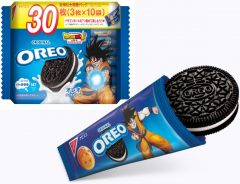
New Dragon Ball Movie collaborates with Oreo Cookies!


Note: This text is reproduced verbatim and provided courtesy of © Fuji Television Network, Inc.
(Interview Date: January 2021)
Here’s an interview with Ken Murase, the producer of the live-action film “The Promised Neverland” at Fuji Television.
Ken Murase (producer of the live action film “The Promised Neverland”)
The original work has sold over 25 million copies worldwide, and the first season of the animated version broadcasted on the “noitaminA” animation slot was a hit that has been distributed worldwide by Netflix. Please tell us your impressions of the original work or the animation version?
I first came across "The Promised Neverland" in the early days of the popular youth comic magazine, "Weekly Shonen Jump." I was only a few issues into the series, but I still remember well, the sudden feelings of an electric current that ran through me, the moment it was revealed that the children who had been living happily and comfortably in a wealthy orphanage were actually being raised to become food for demons. And the main characters, Emma and Norman, were all trying to escape from the orphanage without being noticed by ‘Mama’ Isabella who pretends to be a generous mother for the kids. I realized, “what an interesting story!” and I thought, “I definitely want to make this into a live-action film.” So, I immediately contacted SHUEISHA, the publishing company for the original story. I was reading it ever since, and as I work in the field of content production myself, I've always been deeply admired by the imaginative skill of the original author, Kaiu Shirai, who always manages to skillfully catch the readers off guard.
And then there's Posuka Demizu's wonderful art which manages to create a visual world that can be cute, beautiful, and even emotional, which also made me feel certain, that this manga has been created to an unbelievable level of high quality! I was so impressed that I was hooked on it week by week, but I gradually became afraid that all of this would be too hard to make into a live-action.
Please tell us about the difficulties you faced in adapting the visual world of the original work into a live-action film, and what you were particular about?
I had to create a world that doesn’t exist anywhere else, and I really struggled with this, but I knew that how we manage to pull through this challenge would inevitably determine the overall outcome of the film, so I tried to make it as faithful and as thorough as it can possibly be. Of course, it is difficult to create a world that doesn’t really exist, this being the same for most fantasy stories, but both the manga and the animation are set in a beautiful world, so I was conscious right from the beginning of the need to recreate the "beauty" of Grace Field House.
That's why I was so particular about rounding up the right staff and crew members for this production.
First of all, I knew that in order to recreate the visual world of this story, I would need to produce a sense of overwhelming beauty, so I contacted the director of photography, Keisuke Imamura before anyone else. I had worked with him on the movie "TEIICHI - Battle of Supreme High -" and I knew that he was incredibly skilled with the use of light and shadow effects, and that he could shoot incredibly beautiful images. I thought that he would be the best man to help us recreate the world of “The Promised Neverland,” so I contacted him before the director was even decided.
And the production department (the team who looked for the filming locations) did a great job in finding the best forest areas and buildings that looked just like in the original story. I was so astonished with feelings of heartfelt gratitude. It was like, “how did they actually manage to find these places?!” Speaking to them about it, it made me realize that this process was nothing of the ordinary with many challenges along the way. This is because you're filming in Japan for a setting that looks like it could only be in overseas. Many people who saw the film came up to me and were like, “so it seems like you filmed it abroad. Which country did you shoot it in?” After this, it felt like we had succeeded on our original aim. As an answer to this question, actually we had shot most of the scenes in Nagano and Fukushima Prefecture in Japan!
The other thing I was particular about was the music. The original story was often said to be “impossible to be reproduced as a live-action in Japan,” so I knew from the beginning that the soundtrack also had to have the essence and quality of an international film, alongside the movie’s visual imagery. When I was in the drama production team, I worked with Masahiro Tokuda for the drama series, “Love That Makes You Cry,” which I produced for Fuji TV’s prime-time Monday night drama slot. He was just overwhelmingly wonderful, and I thought he could create the fantasy world of the movie, with inspirational melodies that would simply grab your heart, so he kindly took this part on board for us. As a result, he created for us, soundtracks that many people said to me was “just like of a Hollywood movie,” and I believe that this also gave us a great boost for designing a world we wanted to create.
Please tell us the reasons for casting Minami Hamabe as Emma, Keiko Kitagawa as Isabella, Naomi Watanabe as Krone, Kairi Jyo as Ray, and Rihito Itagaki as Norman?
Initially, we were thinking of setting the ages of Emma, Ray and Norman as 11-year-old kids as in the original story, so we auditioned hundreds of potential cast members of this generation for the roles.
Particularly for the character Emma, finding the cast for her was really challenging. She has to make audiences believe with her incredible cheerfulness that she could attain everything with her never-give-up attitude by trusting her peers. I wanted to look for someone who naturally projects out this kind of aura, so I desperately looked for such an individual and if there was someone with this potential, I immediately went to meet them. I even went so far as to consider someone I saw on “TikTok” (video-sharing app) who may fit the above criteria. However, even after almost a year, I hadn't been able to find the right candidate. In the midst of this casting challenge, I gathered the potential cast members I had selected as candidates and asked them to read lines from “The Promised Neverland” in a workshop style audition. However, it all felt a little too childish and wasn’t convincing enough for me. In the original story, Emma and her friends are incredibly smart, and the escape plan they come up with, is as good as any adult’s. So, when actual 11-year-olds exchanged the dialogues for these characters, it unfortunately turned out to be a little unrealistic.
When I had a discussion about this with the creators of the original story, they mentioned that the mental age of the characters were based around kids of about 15- years-old (a little higher than the actual ages of the characters), so, I asked if it would be okay to raise the age setting of the characters for the live-action and they were okay with it. From this point onwards, I had no more doubts about who we were going to cast. This was because I had already known the right actress, who could play the character that makes audiences believe with her incredible cheerfulness, that she could attain everything with her never-give-up attitude by trusting her peers, as I had already mentioned earlier on in the interview.
The actress was Minami Hamabe. She possesses an aura of brightness like the sun, the sense of fortitude to endure hardships, and the strength to overcome them. She is the one and only actress who possesses all of these qualities from her generation. I knew that she would be perfect for the role of Emma. I had always thought that she had this aura that maybe she could possibly save the world, kind of like a heroine. Actually, I met her when she was 11-years-old, and by the time she was 12, I had already asked her to be in one of my productions. So, from the time I was looking for an 11-year-old Emma, I was thinking, “oh, I wish I could find someone like her back then.” At this point, she had turned 18, but had often played the role of a character who was in the first year of high school, and I knew that if we were going to set the age of Emma at 15, she would be able to make it through with her acting ability. And as you all have witnessed, she managed to play the character perfectly.
As for Isabella, I could only think of Keiko Kitagawa right from the beginning. I think this is already the case for everyone that know the original story. In Hollywood, I think it would be Charlize Theron, but in Japan, there’s no one else but Keiko Kitagawa. The beauty, the intelligence, the kindness which manages to encompass everything around, and the sense of mysteriousness which goes with it. She’s the only one who has it all, right? She seemed perfect for the casting role of Isabella from the manga. In fact, when she came down from the costume fitting for the first time and appeared in front of everyone, all the staff and crew members were like, “wow, it's Isabella” (laughs). We are so glad that she took the role on board.
As for Krone, Naomi Watanabe quickly popped into my mind. To express the character’s sense of gracious presence, including her forms of funny expressions and gestures as in the original story, we thought she would be a good cast to fulfil the role. I believed that she would be able to play the part in a fresh new way. So, I hope everyone will enjoy and be entertained by watching Krone in the film.
Also, I had my heart set on Kairi Jyo to play Ray, right from the beginning. This is because ever since I had made up my mind about making a live-action version of “The Promised Neverland,” I had done many auditions with children as mentioned earlier, and in the early stages of that process, I saw the film “Shoplifters” at a press preview screening before it had been released to the general public. During this screening, I thought, “oh, there's Ray!” I was instantly captivated and immediately thought so. Of course, he has that sense of cynicalness, but more than that, I realized that he has the charm that makes it hard for anyone to take one’s eyes off him when he’s on screen. I immediately contacted his management agency and consulted them on whether it would be possible to keep his summer schedule free (for filming). All of this was still even before “Shoplifters” was released, so the managers at his agency were quite surprised (laughs).
And as for the role of Norman played by Rihito Itagaki, we held an audition. After deciding to raise the age setting for the casting roles of Emma and Ray, my mind had already been decided for their roles. But as for Norman, we needed someone who seems intelligent, calm and kind, but has a sense of great passion deep down than anyone else. One time, as we were looking for a guy with a ‘beautiful appearance,’ Miho Kobayashi, a producer, told me that she saw a boy in a late-night drama who kind of seemed like Norman. Eventually, we asked him to come down to Fuji Television and had a meeting at the company café. At first glance, I thought, “wow, he’s Norman.” And when I talked with him, I thought, “seriously, he's really Norman,” and from that point, I immediately decided that he would be perfect for the role. He was calm for his age, had pure and innocent looking eyes, and above all, he had the kind of a neutral charm that made him seem like the character. After that, we asked him to attend an audition, and the director liked him very quickly and he was then casted for the role.
This movie was made possible because of these five cast members. I believe that the live-action adaptation of the original story was made possible, because they were all miraculously present during this generation.
Finally, please tell us about many of the appealing areas of this film?
First of all, the entertaining value of “The Promised Neverland” with its original setting and its exciting storyline combined, both of which have been seamlessly made into a live-action to its fullest potential is one. On top of that, compared to the comic books and animations, the “live-action” version is attractive in a sense that it has been casted with actual people. And thus, I believe that the audience will be able to feel that this story is not simply a fantasy, but something that could be rooted to the world we live in. I think that these may be regarded as the charms of the “The Promised Neverland” as a live-action. And that's why I think it's a movie that can be enjoyed by both fans of the original story and also those who don't know the original story at all, so I hope that people on both sides will enjoy it.
Ken MURASE (村瀬健): Profile
After joining Fuji Television in 2008, he was assigned to the drama production department where he was involved in the production of hit TV series including “Homeroom on the Beachside,” “BOSS,” “SUMMER NUDE,” “NOBUNAGA CONCERTO” and “Love That Makes You Cry.” In 2016, he moved to the movie production department where he produced renowned titles such as “Nobunaga Concerto: The Movie,” “TEIICHI - Battle of Supreme High -” and “Tonkatsu DJ Agetaro.” And in June 2021, his first original project film “CHARACTER” starring Masaki Suda and Fukase (SEKAI NO OWARI) is scheduled for release.
©白井カイウ・出水ぽすか/集英社 ©2020 映画「約束のネバーランド」製作委員会